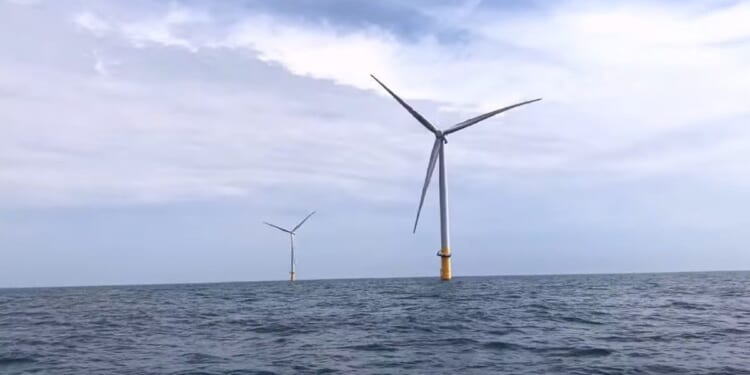Several big tech companies touting a 100% renewable energy label could exacerbate America’s risk of blackouts, according to a letter led by Republican Montana Attorney General Austin Knudsen and signed by several other state attorneys general.
Knudsen wrote to several major tech companies on Wednesday — including Google, Amazon, Microsoft and Meta — stating that their claims regarding “100% renewable energy” ignore the reality that they likely still rely on a grid that is 60% powered by fossil fuels. Knudsen argues in the letter that not only are these claims misleading but also signal that intermittent sources like wind and solar are sufficient to power America’s grid, despite warnings from energy experts, grid operators and watchdogs, including the Department of Energy (DOE), that phasing out reliable energy sources could exponentially increase blackout risks.
“As a result of big tech’s misleading energy use claims, coal and natural gas plants are being shut down, putting communities across the country at an increased risk of blackouts over the next few years. In Montana, reliable energy – like fossil fuels – are a vital part of our economy and keep us warm during harsh winters,” Knudsen told the Daily Caller News Foundation. “Not only is our electric grid being threatened, but the companies could be in violation of Montana law. As attorney general, I am committed to getting answers.”
2025-09-24 AG Letter to Tech Companies on REC by audreystreb
After years of stagnation, energy demand is rising in the U.S. along with costs as the anticipation of power-hungry data centers looms large. Aging energy infrastructure and aggressive green energy mandates set by former President Joe Biden and several Democrats at the state level have tightened the supply of reliable, baseload power sources like coal.
Biden sought to phase out coal across America and signed off on stringent emissions goals that were set to severely strain the power grid, according to energy sector experts. In contrast, the Trump administration has moved to bolster reliable energy sources like coal and nuclear.
One July DOE report warns that America’s risk for blackouts will increase 100-fold by 2030 if the U.S. continues to shutter reliable power plants without adequate replacements. Knudsen argues in the letter that tech companies touting a 100% renewable label risk adding to blackout concerns, since it signals that the growing demand from data centers can be met solely by intermittent sources like wind and solar.
Fourteen additional Republican attorneys general signed onto the letter, including those from Alabama, Alaska, Arkansas, Indiana, Iowa, Florida, Kansas, Nebraska, North Dakota, Oklahoma, Pennsylvania, West Virginia, South Carolina and Wyoming.
“We are also concerned that the unrealistic claim of 100% renewable energy contributes to the present grid-reliability crisis,” the letter states. “Tech companies have not only created skyrocketing demand for electricity but also locked up relatively rare baseload sources like nuclear power for themselves, while pushing utilities towards harmful net-zero goals that require greater reliance on intermittent renewable power sources for everyone else.”
Knudsen wrote that these companies aim to, or claim to, match all of their energy use with renewable sources through the potential purchase of unbundled “renewable energy certificates” (RECs). The Montana attorney general argues that big tech’s “100% renewable” energy language stemming from these potential purchases is misleading as the companies are still relying on the fossil fuel-laden grid.
Knudsen continues to argue that these “100% renewable” claims from tech companies may have accelerated the phase-out of reliable power plants as utilities move to incentivize the proliferation of data centers through aggressive green energy goals.
Meta, Google and Microsoft did not respond to the DCNF’s requests for comment and Amazon referred the DCNF to its “Renewable Energy Methodology,” which confirms the company’s use of RECs.
“These utility commitments have helped contribute to the phenomenon of early retirement of coal and natural gas plants, which is raising state concerns and threatening the integrity of the electric grid,” the letter states, citing Constellation’s commitment to phasing out fossil fuels as one example. The DOE recently ordered Constellation to keep one of its oil and gas plants running to prevent blackouts, the letter notes.
Knudsen states in the letter that tech companies still rely on grid electricity, much of which comes from fossil fuels, and that many are reportedly turning to nuclear power to address their electricity supply crunch. Notably, several big tech companies like Microsoft and Google have reportedly abandoned their carbon neutrality goals after struggling to meet them, according to multiple reports.
“Big tech’s efforts to lock up nuclear power are necessary for tech companies to actually meet their net-zero commitments — commitments which are currently propped up by misleading climate marketing based on unbundled REC use,” Knudsen writes, noting that tech companies’ net-zero commitments and 100% renewable energy labels “pressure utilities to move away from fossil-fuel-generated baseload power to attract or retain big tech data center development.”
“Major tech companies use unbundled RECs to claim that they have achieved 100% renewable energy ‘use’ or ‘consumption,’ and also have reduced their emissions. Both types of claims appear to be false or deceptive. Purchasing unbundled RECs does not mean that the companies are using renewable energy, or that they are reducing emissions,” the letter states. “Because it is currently impossible to sustain the amount of energy required by data centers with renewables like wind and solar power due to their intermittent qualities, many tech companies claiming 100% renewable energy usage and hoping to move away from their reliance on unbundled RECs are looking to ‘lock up’ a more reliable form of clean energy — nuclear power.”
The Obama Federal Trade Commission (FTC) rewrote a guidance document called the “Green Guides,” updating “renewable” energy claims in 2012. Author and energy expert Alex Epstein wrote that the Obama-era guidance update allows “companies [to] falsely claim to be ‘100% renewable.’”
“It’s time to stop hundreds of companies including Apple, Google, and Meta from lying about being ‘100% renewable’ and deceiving American voters into thinking that solar and wind can power a modern economy,” Epstein wrote. “When a company says they are ‘100% renewable,’ it suggests that the company has figured out a way of just powering itself via solar and wind. People would not be impressed if they knew that the company was simply using its money to blame-shift its massive non-renewable energy use.”
Knudsen concludes the letter with 21 questions for tech companies, inquiring if they are using unbundled RECs and why several of their sustainability reports seem to contradict reality.
All republished articles must include our logo, our reporter’s byline and their DCNF affiliation. For any questions about our guidelines or partnering with us, please contact [email protected].
DONATE TO BIZPAC REVIEW
Please help us! If you are fed up with letting radical big tech execs, phony fact-checkers, tyrannical liberals and a lying mainstream media have unprecedented power over your news please consider making a donation to BPR to help us fight them. Now is the time. Truth has never been more critical!
Success! Thank you for donating. Please share BPR content to help combat the lies.
We have no tolerance for comments containing violence, racism, profanity, vulgarity, doxing, or discourteous behavior. Thank you for partnering with us to maintain fruitful conversation.


![Scott Bessent Explains The Big Picture Everyone is Missing During the Shutdown [WATCH]](https://www.right2024.com/wp-content/uploads/2025/11/Scott-Bessent-Explains-The-Big-Picture-Everyone-is-Missing-During-350x250.jpg)













